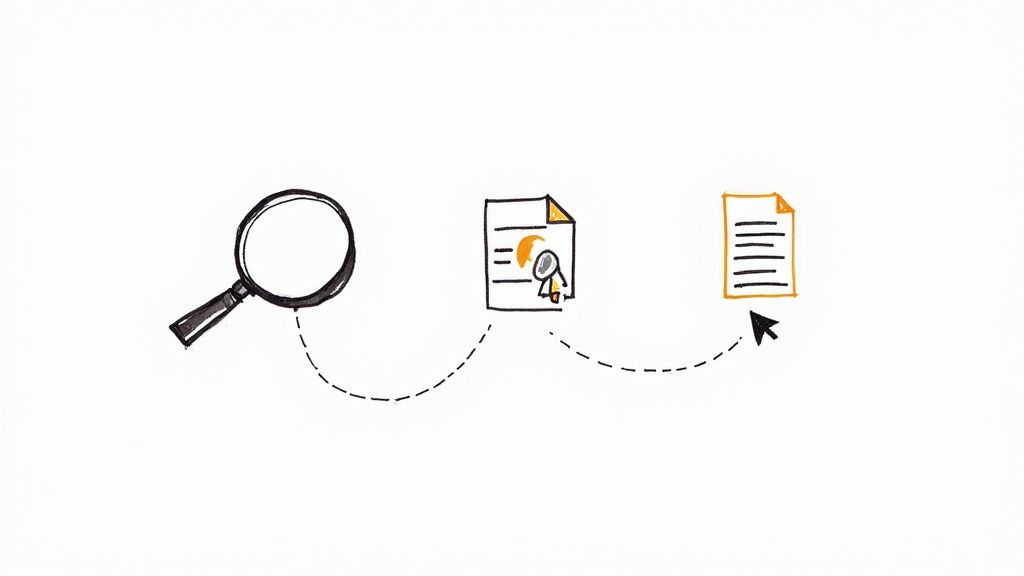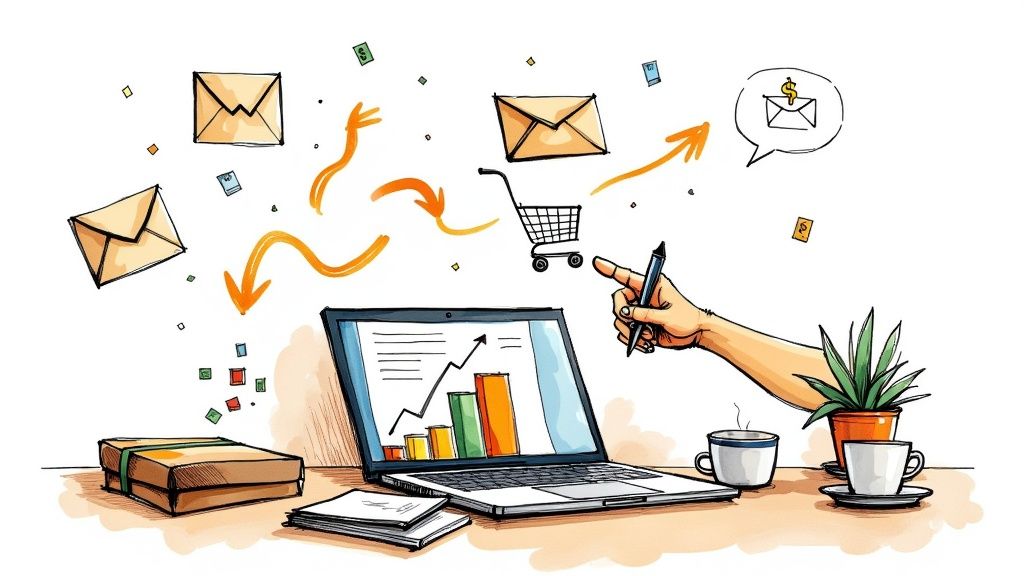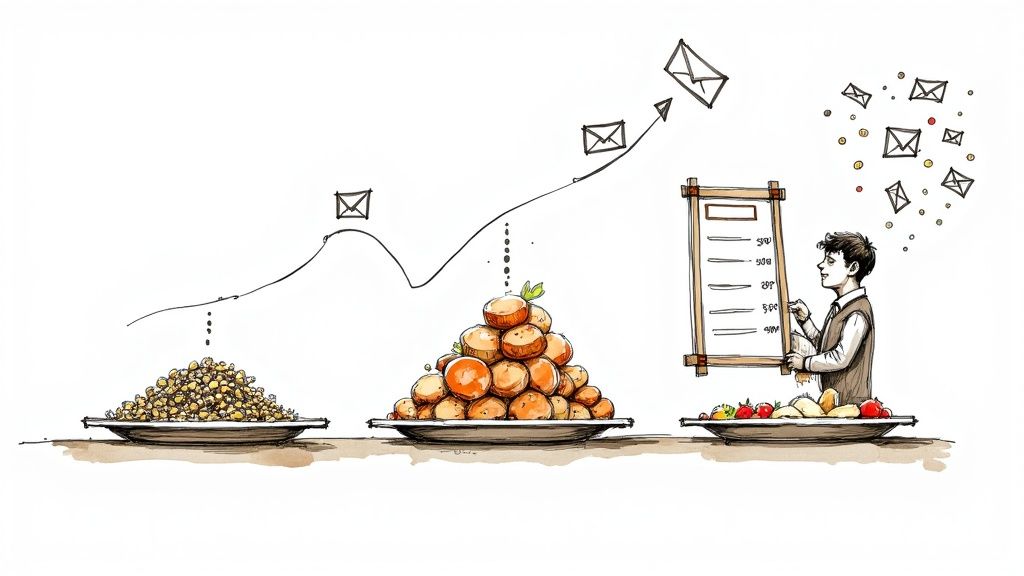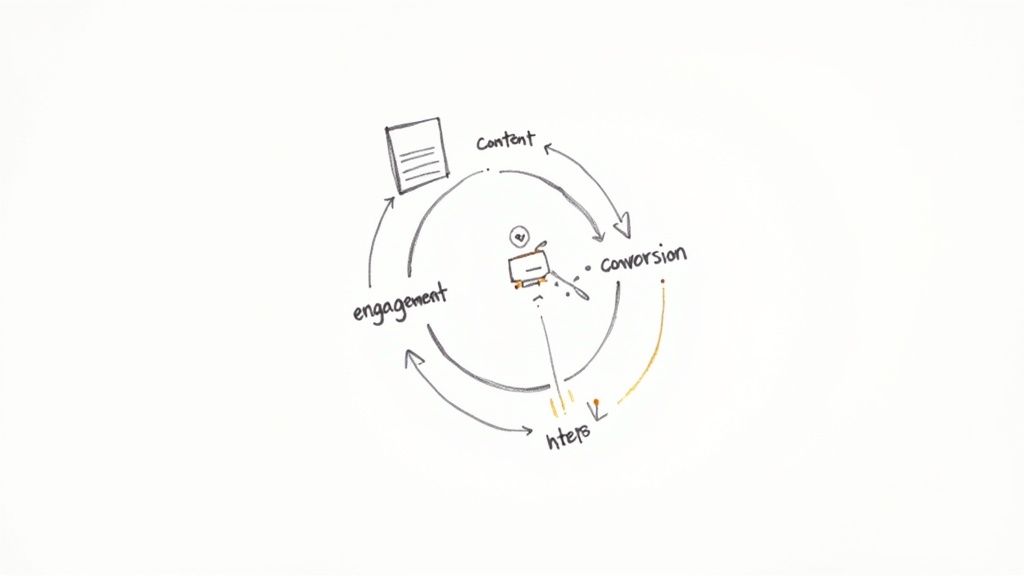Digital Marketing Agency Ecommerce: Your Complete Guide

17 mins
6/16/2025
Joe Ervin
- digital marketing agency ecommerce
- ecommerce marketing
- agency selection
- online sales
- conversion optimization
Why Ecommerce Marketing Demands Specialized Expertise

Think about building a house. You could hire one general contractor, or you could bring in electricians, plumbers, and carpenters – each a specialist in their craft. A generalist might seem cheaper upfront, but specialized expertise often gets you a better, more efficiently built final product. Ecommerce marketing works the same way.
A general digital marketing agency might know some SEO and social media. But a digital marketing agency ecommerce specialist truly understands the detailed strategies you need to thrive in the competitive world of online retail. That specialized knowledge turns into better campaigns and, importantly, a higher return on investment.
The Unique Challenges of Ecommerce
Ecommerce comes with unique hurdles that general marketing agencies often miss. Take inventory management, for example. A sudden spike in demand can wipe out your stock, leading to missed sales and unhappy customers. A specialized ecommerce agency plans for these changes and connects marketing campaigns with inventory levels. This creates a smoother experience for your customers. It's not just about pausing ads when you're out of something; it's about strategically promoting other products or offering pre-sales for upcoming items.
Seasonal buying patterns also have a big impact on ecommerce sales. A general agency might stick with the same marketing plan all year. An ecommerce specialist, however, knows how to make the most of key shopping times like Black Friday and Cyber Monday with targeted campaigns. This means advertising ahead of time, running special deals, and having optimized landing pages ready to turn holiday browsers into buyers.
Even after the sale, the post-purchase experience is key to building customer loyalty. A general agency might focus mainly on getting new customers. But an ecommerce agency understands the importance of keeping customers happy after they buy through things like personalized emails, exclusive offers, and loyalty programs. This turns one-time shoppers into loyal fans, helping your business grow steadily over time.
Digital marketing agencies are crucial to the tremendous growth of global ecommerce, a world constantly reshaped by consumer habits and new platforms. Statista data shows retail ecommerce sales projected to pass $4.3 trillion globally in 2025, growing from just over $6.9 trillion for the broader ecommerce market in 2024. Note, the $4.3 trillion figure refers specifically to retail ecommerce. Mobile commerce is a major factor, representing 59% of all ecommerce sales in 2025—about $4.01 trillion. Learn more about ecommerce growth here.
The Power of Specialized Knowledge
An ecommerce specialist at a digital marketing agency also gets the complexities of different ecommerce platforms like Shopify, Amazon, and WooCommerce. They know how to optimize product listings, run ad campaigns, and use platform-specific tools to boost your sales. This deep knowledge gives you a real edge, making sure your marketing fits the specific needs of each platform. In the end, working with a specialized digital marketing agency ecommerce expert isn't just about marketing your products; it's about building a successful online business ready to handle the challenges and changes in the world of ecommerce.
Essential Services That Transform Browsers Into Buyers

Think of your ecommerce business like a well-oiled machine. Each service provided by a specialized ecommerce marketing agency is a vital part, all working in sync to drive your business forward. The best agencies don't just offer individual services; they create a complete, integrated marketing system. This is where SEO supercharges paid ads, email cultivates social media leads, and conversion optimization amplifies everything.
Technical SEO: Building a Solid Foundation
Technical SEO isn’t just about sprinkling keywords everywhere; it's the bedrock for all your other marketing efforts. For ecommerce, this means structuring your site so both search engines and customers can easily navigate it. A well-organized site helps Google understand your products, making it easier for customers to find what they're looking for. This includes things like optimizing site speed, ensuring it's mobile-friendly, and using structured data. All these elements work together to create a smooth, positive user experience, resulting in better search rankings and more sales.
Paid Advertising: Connecting with Eager Buyers
Paid advertising, particularly paid search and social media ads, lets you reach potential customers actively searching for products like yours. It's like putting your products right in front of people already interested in buying them. An agency specializing in ecommerce understands the ins and outs of each platform and can craft campaigns to maximize your return on ad spend. This includes detailed keyword research, A/B testing ad visuals, and continuous optimization to ensure your campaigns perform at their best.
Email Marketing: Cultivating Relationships and Loyalty
Getting new customers is important, but nurturing existing ones is just as crucial for sustained growth. Email marketing is a great way to build relationships with your customers, keep your products fresh in their minds, and encourage repeat purchases. You might be interested in: Check out our guide on ecommerce customer retention. This could involve sending personalized product recommendations, exclusive discounts, or valuable content to keep your brand at the forefront. This approach builds loyalty and transforms one-time buyers into enthusiastic brand advocates.
Social Media Marketing: Building a Community
Social media isn’t just about posting attractive images; it’s about creating a community around your brand. An ecommerce-focused digital marketing agency knows how to use each platform's unique features to connect with your target audience and drive traffic to your store. This could involve running contests, partnering with influencers, or simply sharing interesting content that resonates with your ideal customer. This fosters a sense of belonging and strengthens your brand's identity.
One significant trend for these agencies is the growth of social commerce and platform-specific strategies. Social commerce is projected to reach $1.2 trillion globally by 2025, underscoring the importance of platforms like Instagram, TikTok, and Facebook. Plus, 75% of consumers begin their shopping journey with a Google search, and 63% of all shopping experiences start online, making SEO and paid search vital. Discover more insights on these ecommerce trends here.
Conversion Rate Optimization (CRO): Turning Lookers into Buyers
Imagine lots of traffic coming to your store, but only a small fraction actually buy anything. That’s where CRO comes in. By studying user behavior and finding areas for improvement, an ecommerce marketing agency can optimize your website to encourage more conversions. This might mean streamlining the checkout process, improving product descriptions, or adding stronger calls to action. These seemingly minor tweaks can significantly impact your bottom line. All these services, when combined effectively, transform casual browsers into loyal, paying customers.
To further illustrate the key differences between specialized ecommerce agencies and general marketing agencies, let's take a look at the following comparison:
Essential Ecommerce Marketing Services Comparison: A comprehensive comparison of core services offered by specialized ecommerce agencies versus general marketing agencies
| Service Category | Ecommerce Specialist Focus | General Agency Approach | Impact on Sales |
|---|---|---|---|
| Technical SEO | Site architecture, product schema, page speed, mobile optimization for enhanced product visibility & user experience | Basic SEO practices, may lack ecommerce-specific expertise | Directly influences organic search rankings and conversion rates |
| Paid Advertising | Product-focused campaigns on Google Shopping, targeted social media ads, retargeting strategies | Broader audience targeting, may not prioritize product-level optimization | Drives targeted traffic and boosts product visibility, leading to higher conversion potential |
| Email Marketing | Personalized product recommendations, automated abandoned cart emails, segmented customer journeys | Generic email blasts, less emphasis on product promotion | Nurtures leads, encourages repeat purchases, and builds customer loyalty |
| Social Media Marketing | Building communities, influencer collaborations, shoppable posts, platform-specific strategies | Brand building, community engagement, may lack direct sales focus | Enhances brand awareness and drives traffic, indirectly impacting sales |
| Conversion Rate Optimization (CRO) | Data-driven A/B testing of product pages, checkout process, and calls to action | General website CRO, may not focus on product-specific optimization | Directly improves conversion rates, leading to higher sales |
As you can see, a specialized ecommerce agency dives deeper into the nuances of online retail, tailoring strategies to directly impact sales. While a general agency can offer valuable services, their approach may lack the laser focus needed to truly maximize your ecommerce potential.
Platform Mastery: Why Specialization Creates Success

Imagine building a house with just one tool. Sure, you could probably lay a few bricks, but good luck with the wiring or plumbing! Just like a skilled contractor needs the right tools for each job, succeeding in ecommerce requires a deep understanding of each platform you use. A top-notch ecommerce digital marketing agency gets this. They know a generic approach just won't work.
Every platform, from Shopify to Amazon to WooCommerce, has its own quirks and best practices. It's like learning a new language – you can't just translate word-for-word. You need to grasp the underlying structure and culture.
Why Technical Nuances Matter
Take Shopify, for instance. Its power lies in its extensive app ecosystem and highly customizable themes. A specialized agency knows how to weave these elements together for a smooth, on-brand customer journey. They can even help you avoid common theme limitations and recommend apps that perfectly complement your marketing objectives. This targeted approach can really boost your sales.
Amazon, on the other hand, is a completely different ballgame. Winning on Amazon means mastering its intricate advertising platform and often-opaque ranking factors. A specialized agency acts as your guide through this dense jungle, optimizing your product listings, managing your ad spend, and boosting your visibility. They understand the nuances of keywords, the power of reviews, and the delicate balance of competitive pricing.
Looking at consumer trends and the influence of different platforms shows just how important it is for agencies to be flexible and data-driven. Amazon dominates with 44% of US ecommerce sales, making Amazon marketing crucial for any agency focused on the American market. Globally, however, the landscape is more diverse, with Shopify, WooCommerce, and Amazon all vying for merchant attention. Each platform demands its own distinct area of agency expertise. You can explore more of these trends here.
Staying Ahead of the Curve
Ecommerce platforms are constantly evolving, rolling out updates and new features at a dizzying pace. The best ecommerce agencies are always learning, constantly adapting their strategies to keep their clients ahead of the competition. They follow industry news, attend conferences, and test new approaches so you don't have to.
For a deeper dive into content strategy, check out this article: Learn more in our article about ecommerce content strategy. These specialized agencies don't just manage campaigns; they guide clients toward the platforms that best suit their specific business needs and growth ambitions. They take the time to understand your target audience, your products, and your long-term goals. This may lead you to Shopify's flexible platform, the vast reach of Amazon, or the open-source nature of WooCommerce. The key takeaway? Choosing the right platform is the foundation of a thriving online business. In today's competitive ecommerce world, platform mastery isn't just beneficial; it's essential.
Understanding Agency Investment and Pricing Reality

Let's talk frankly about the financial side of working with an ecommerce-focused digital marketing agency. Knowing how these specialists price their services is key to a successful partnership. The best agencies view their fees as an investment in your growth, not just a cost. Their pricing models should be designed to scale alongside your business.
Demystifying Pricing Structures
There are several common pricing models used by ecommerce digital marketing agencies. Each has its own set of pros and cons, so understanding them is crucial.
Percentage of Ad Spend: The agency charges a percentage of your overall advertising budget. This model is easy to grasp, but it might encourage agencies to focus on spending rather than outcomes.
Performance-Based: Payment is directly tied to reaching specific targets, like sales or leads. This aligns incentives nicely, but you'll need clearly defined, measurable goals from the outset.
Project-Based: This involves a fixed fee for a defined scope of work, such as a website redesign or a specific campaign launch. It gives you budget predictability, but it can be inflexible if your needs evolve mid-project.
Retainer-Based: A set monthly fee covers a pre-agreed set of services. This provides consistency, but you'll need to regularly evaluate whether you're getting your money's worth.
Value-Based: Pricing centers around the overall value delivered by the agency, often combining a mix of services customized to your unique business goals. This model requires strong trust and open communication.
To illustrate, a small ecommerce startup might opt for a percentage-of-ad-spend or project-based model. Meanwhile, a larger, established company might prefer a value-based or performance-based approach. Let's take a closer look at these models in the table below.
To help you compare these options, here’s a breakdown of the most common pricing models used by ecommerce agencies.
Agency Pricing Models Breakdown Detailed comparison of common ecommerce agency pricing structures with pros, cons, and typical investment ranges.
| Pricing Model | Typical Range | Best For | Pros | Cons |
|---|---|---|---|---|
| Percentage of Ad Spend | 5-20% of ad budget | Businesses with established ad budgets | Simple to understand, predictable costs. | May incentivize spending over results. |
| Performance-Based | Varies depending on KPIs | Businesses with clearly defined goals | Strong alignment with business objectives. | Requires precise goal setting and tracking. |
| Project-Based | Fixed fee per project | One-off projects or defined campaigns | Budget predictability, clear scope. | Can be inflexible, potential for scope creep. |
| Retainer-Based | Fixed monthly fee | Ongoing marketing support and services | Consistent support, predictable monthly costs. | Requires careful evaluation of value received. |
| Value-Based | Customized pricing based on value delivered | Businesses seeking long-term strategic partnerships | Focus on overall business growth, flexible solutions. | Requires high trust and open communication. |
As you can see, each pricing model has its place depending on your specific business needs and goals. Choosing the right one is a key factor in a successful agency partnership.
Evaluating Proposals and Identifying Red Flags
Evaluating agency proposals is a lot like assessing a potential employee. You need to look beyond the surface and ask some tough questions.
Does the proposal truly address your specific needs and challenges? Or does it offer generic solutions that could apply to any business?
Are the proposed Key Performance Indicators (KPIs) both realistic and measurable? How will you track progress and hold the agency accountable?
What's clearly spelled out in the contract, and what's left open to interpretation? Be wary of hidden fees or restrictive clauses.
Does the agency demonstrate a real understanding of your target audience and the ecommerce landscape? Do they speak your language, or do they rely on industry buzzwords?
One major red flag is an agency fixated on vanity metrics like website traffic or social media followers. Real success in ecommerce is measured by sales and revenue growth. Another red flag is an agency that's not upfront about pricing or contract terms.
Negotiating Partnerships that Scale
Negotiating with a potential ecommerce agency partner shouldn't be adversarial. It should be a collaborative process. Both sides should be invested in creating a win-win relationship.
Clearly Define Roles and Responsibilities: Who is responsible for what, and how will communication happen?
Establish Regular Check-Ins and Feedback Loops: How often will you meet, and how will you address challenges and changes in strategy?
Create a Flexible Agreement: How will the partnership adapt as your business grows and your needs change?
Simply choosing the cheapest agency often backfires. A low price tag can mean poor service, lack of experience, or ultimately, wasted time and money. The true Return on Investment (ROI) of an agency partnership lies in how effectively it drives sustainable growth. This means higher revenue, better profit margins, and a stronger brand presence. By understanding pricing models, critically evaluating proposals, and negotiating strategically, you can build agency relationships that power your long-term ecommerce success.
Reading Between The Lines of Agency Portfolios
Finding the right ecommerce-focused digital marketing agency is like finding a hidden gem – it takes careful examination. Anyone can create a shiny case study, but real expertise shines through in the details. Think of it like detective work: you're looking for the real story behind the polished presentation. The best agencies don't just show off vanity metrics; they explain their strategies, the hurdles they overcame, and the specific actions that led to measurable results.
Decoding the Case Study: Look Beyond the Surface
Learning to decipher case studies is crucial. It's about looking beyond the impressive numbers and understanding the how and why of their success.
Focus on the Process: Don't just glance at the final numbers. Examine the agency's approach. Did they lay out a clear strategy? Did they explain how they adjusted to challenges? A thorough explanation of the process is a strong sign of true expertise.
Identify Specific Tactics: Look for information about the precise marketing techniques they used. Did they make the most of platform-specific features? Did they combine SEO, paid ads, and email marketing? Understanding their tactics gives you a better understanding of the agency's abilities.
Look for Measurable Impact: Impressive-sounding metrics don't always equal real business growth. Focus on results that boost revenue. Did the agency help their client increase sales? Did they improve conversion rates? These are the metrics that truly matter.
For example, a case study might highlight a 200% increase in website traffic. While this sounds impressive, it's only part of the story. A good detective would ask: Did this traffic lead to more sales? What strategies specifically caused this traffic increase? This deeper investigation uncovers the real impact. Check out our guide on ecommerce customer journey for more context.
Verifying Claims and Client References
Like any good detective, you need to check your sources. Client references are a valuable part of your investigation.
Ask Specific Questions: Don't just accept general praise. Ask direct questions about the agency's communication, responsiveness, and problem-solving skills. Did the agency meet deadlines? How did they deal with unexpected issues?
Look for Patterns: When you talk to several clients, look for recurring themes. Do multiple clients praise the agency's strategic thinking? Do they all emphasize the agency's ability to produce results? These patterns offer valuable insights.
Trust Your Gut: If something seems wrong, it probably is. Be cautious of agencies that hesitate to provide client references or avoid your questions.
Recognizing Warning Signs
Spotting red flags can save you from a costly mistake. Some warning signs include:
Overreliance on Vanity Metrics: Agencies that focus on superficial metrics like likes and followers might be more concerned with appearances than results.
Lack of Transparency: Be wary of agencies that are unclear about their pricing, contract terms, or processes.
Generic Case Studies: Case studies that lack specifics or that could apply to any business are a sign of a one-size-fits-all approach.
By approaching agency evaluation with a detective's mindset, you can cut through the marketing hype and find genuine expertise. This empowers you to choose a digital marketing agency ecommerce partner who can truly boost your business growth.
Building Partnerships That Drive Long-Term Growth
The best ecommerce digital marketing agency partnerships feel like bringing a marketing expert onto your team as a co-founder. They grasp your needs, question your assumptions, and uncover hidden opportunities. But nurturing these relationships takes effort, open communication, and shared responsibility – it’s more than just reviewing monthly reports.
Onboarding for Success: Laying the Foundation
Effective onboarding paves the way for a successful partnership. Think of it like welcoming a new team member. You wouldn't just assign them a project without any background information. Likewise, a smooth onboarding ensures the agency understands your business from the inside out.
Shared Understanding of Goals: Clearly define your objectives. Are you aiming for increased sales, brand awareness, or expansion into new markets? Making sure everyone is on the same page from the get-go is critical.
Deep Dive into Your Business: Provide the agency with crucial data, such as website analytics, customer demographics, and past marketing performance. The more they know, the more effectively they can customize their strategies.
Establish Clear Communication Channels: How will you communicate daily? Will you rely on project management software like Asana, regular emails, or weekly calls? Setting these expectations upfront prevents confusion and keeps everyone informed.
Communication Frameworks: Maintaining Momentum
Open and consistent communication is the heart of a successful partnership. Regular check-ins and feedback are key, just like with any team.
Regular Reporting and Analysis: Set a consistent reporting schedule to monitor progress and pinpoint areas for improvement. Don't simply focus on surface-level metrics. Delve deeper to understand what's working, what isn't, and the reasons behind it.
Proactive Problem Solving: Encourage the agency to address potential issues early on. This proactive approach allows for quick adjustments and prevents small problems from becoming major setbacks.
Open Dialogue and Feedback: Create a comfortable environment for honest feedback. Both you and the agency should feel at ease sharing concerns and suggestions. This builds trust and strengthens the working relationship.
Adapting and Evolving: Scaling Together
Your marketing needs will evolve as your business grows. The right agency partner can adapt and grow with you.
Regularly Review KPIs: Are your initial Key Performance Indicators still aligned with your current goals? As your business evolves, you may need to adjust your metrics to reflect changing priorities.
Flexibility and Innovation: Encourage the agency to explore new strategies and technologies. The ecommerce world is ever-changing, so staying agile and adapting to trends is vital.
Strategic Planning Sessions: Dedicate time to discuss long-term strategies and future objectives. These sessions ensure the agency stays aligned with your overall vision and continues to deliver maximum value.
Building Strategic Alliances: Beyond the Vendor Relationship
The most fruitful ecommerce digital marketing agency partnerships go beyond a standard client-vendor relationship. They become true strategic alliances.
Mutual Respect and Trust: A solid foundation of trust is built on mutual respect, open communication, and a shared dedication to success.
Shared Vision and Values: Seek out agencies whose core values align with your company's long-term vision. This shared understanding creates a stronger bond and fosters collaboration.
Long-Term Focus: The best partnerships prioritize sustainable growth and building a strong brand presence over time. Focus on these principles to transform a vendor relationship into a valuable strategic partnership that fuels long-term success. An ecommerce-focused digital marketing agency can be more than just a service provider—they can become an extension of your team, propelling your business forward.
Real Stories From The Ecommerce Trenches
Nothing quite compares to learning from those who've been there and done that. So, to guide you in choosing the right agency, we've compiled some raw, unvarnished stories from businesses about their agency partnerships – the good, the bad, and everything in between. These aren't your typical polished case studies, but honest accounts of what really went down.
The Accessories Brand That Soared
Take this accessories brand, for instance. They managed to achieve a staggering 800% growth thanks to a savvy agency partnership. Initially, their marketing was all over the place, lacking focus and consistent branding. They dabbled in a bit of everything without seeing any significant returns. Everything changed when they teamed up with an ecommerce-focused digital marketing agency. The agency honed in on crafting a strong brand identity across every channel, from Instagram to email marketing platforms like Mailchimp. They also put into action a powerful paid advertising strategy, zeroing in on specific customer segments. This blend of brand building and targeted advertising catapulted the brand's growth far beyond their initial hopes.
This story illustrates the strength of a unified strategy. The agency didn't just manage separate campaigns; they created a comprehensive marketing ecosystem where everything worked together in harmony.
The Supplement Company's Journey
Then there's the story of the supplement company that cycled through three agencies before landing on the right one. Their initial experiences were a litany of unmet promises, missed deadlines, and lackluster results. One agency fixated solely on vanity metrics, touting increased website traffic while sales remained stagnant. Another lacked the specific platform knowledge to effectively handle their Amazon advertising campaigns. Finally, they found an ecommerce-focused digital marketing agency that understood their target audience, the competitive landscape, and the specific ins and outs of the supplement industry. This partnership finally brought sustained growth and a considerable boost to their bottom line.
This underscores the crucial importance of doing your homework. Don't just jump on the first agency you come across. Invest the time to carefully assess their expertise, their communication style, and their past performance.
The Retailer’s Transition to Agency-Led Marketing
Finally, we have the story of a well-established retailer who successfully made the switch from in-house marketing to an agency model. Initially reluctant to hand over the reins, they eventually recognized their in-house team simply didn't have the specialized knowledge to keep up with the ever-shifting world of ecommerce. The agency brought new ideas to the table, introducing innovative strategies and using technologies that the in-house team couldn't match. This change led to a significant increase in sales and freed up the retailer to concentrate on their core business operations.
This story demonstrates the wisdom in acknowledging your limitations. Sometimes, the smartest decision is to bring in outside expertise. An agency can offer specialized skills, access to new technologies, and a fresh outlook that can completely revitalize your business.
These real-world stories offer invaluable lessons for any ecommerce business considering partnering with a digital marketing agency. They highlight the importance of a strategic approach, careful evaluation, and open communication. By learning from these experiences, you can steer clear of costly missteps and cultivate partnerships that fuel long-term growth. These examples show the tangible difference an ecommerce-focused digital marketing agency can make, giving you practical insights for choosing the right partner. They shed light on realistic budgets, timelines, and the key early indicators of a successful (or unsuccessful) collaboration. Learn from the journeys of others to boost your own odds of a fruitful agency partnership.





